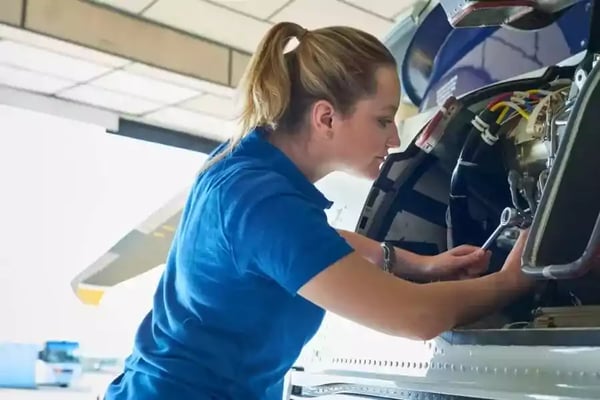The growing role of Artificial Intelligence (AI) in the aviation industry is an opportunity that organizations can’t afford to miss. From predictive maintenance to optimizing flight paths, AI’s potential applications in this space are immense. However, to unlock these opportunities, specific organizational capabilities need to be developed and nurtured. In this article, I will attempt to provide a concise overview of the competencies an organization in our industry needs to fully reap the benefits of the technological advancements in AI. This overview is a distillation of the insights I’ve learned from AI experts in the aviation domain.
.webp?width=778&height=407&name=iStock-1389346376%20(1).webp)
THE DATA DEPENDENCY: QUALITY AND QUANTITY MATTER
AI enables organizations to extract more value from their data, making access to high-quality data all the more valuable. Given the interconnectedness of the aviation industry, where a single flight generates data for various stakeholders, data exchange becomes paramount. Without robust systems for sharing and ingesting data across these stakeholders, the industry stands to lose a significant opportunity for optimization. For instance, airlines have invaluable data on asset utilization that can aid MROs and OEMs in predictive maintenance, R&D and other processes. Similarly, MROs and OEMs possess data that can help airlines improve operational efficiencies.
“…airlines have invaluable data on asset utilization that can aid MROs and OEMs in predictive maintenance, R&D and other processes. Similarly, MROs and OEMs possess data that can help airlines improve operational efficiencies.”
INVESTING IN DATA INFRASTRUCTURE
To effectively leverage AI, aviation businesses should not only collect data but also invest in data infrastructure that allows for secure and efficient data exchange. Data lakes, accompanied by state-of-the-art security protocols, are necessary to store the voluminous data generated. Beyond that, protocols must be developed for data validation, cleaning, and formatting to ensure its quality and reliability.
TALENT MANAGEMENT: BUILDING IN-HOUSE AI EXPERTISE
AI and machine learning models are only as good as the people who build and interpret them. To take internal AI competence one step forward, organizations need to build a team of data scientists and domain experts who can collaborate to develop AI solutions tailored for the organization. The complexity and critical nature of aviation operations require a nuanced understanding of AI, beyond what off-the-shelf solutions can provide.
PARTNERING FOR INNOVATION
With the fast-paced advancements in AI, it’s challenging for any single organization to be able to cover all bases. Strategic partnerships can offer a fast track to acquiring new capabilities. Airlines and tech companies, OEMs and AI research labs, or MROs and data analytics firms can join forces to create synergistic solutions that none of them could accomplish alone.
“To take internal AI competence one step forward, organizations need to build a team of data scientists and domain experts who can collaborate to develop AI solutions tailored for the organization.”
AGILITY AND SCALABILITY
AI is a rapidly evolving field which will have ripple effects to many areas of the organizations operating environment. Organizational agility is important for being able to quickly adapt to changes in the external environment, but also for leveraging AI technologies in internal and collaborative processes.
FINAL THOUGHTS
The capabilities outlined above are by no means exhaustive but serve as foundational pillars for any organization in the aviation industry aiming to navigate the changes brought by AI development, and ultimately to excel in leveraging these new technologies. Developing these capabilities requires a concerted effort from senior management down to operational teams and a commitment to continuous learning and adaptation. In the AI-driven future of aviation, data will indeed be the new oil, and the pipelines that facilitate its flow will become critical infrastructure. Those who invest wisely in these capabilities today will be the industry leaders of tomorrow.

 Henrik Ollus
Henrik Ollus
 If you are interested in knowing how you can improve your efficiency in maintenance operations, book a 30-minutes discovery call with us.
If you are interested in knowing how you can improve your efficiency in maintenance operations, book a 30-minutes discovery call with us.

